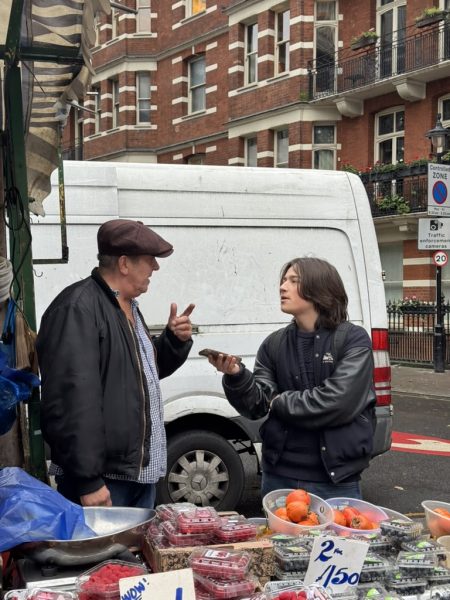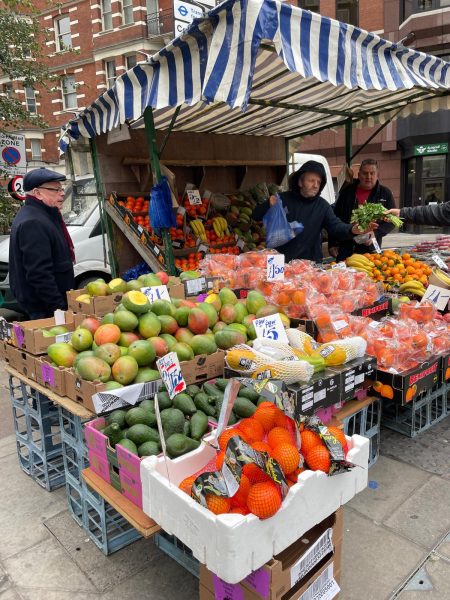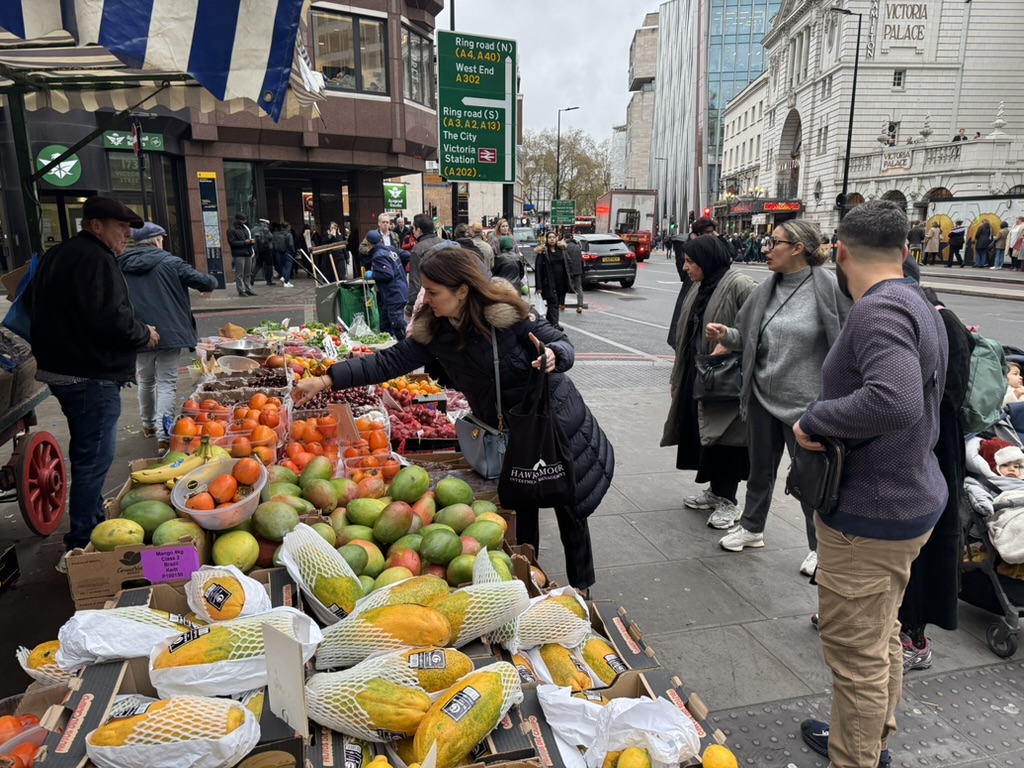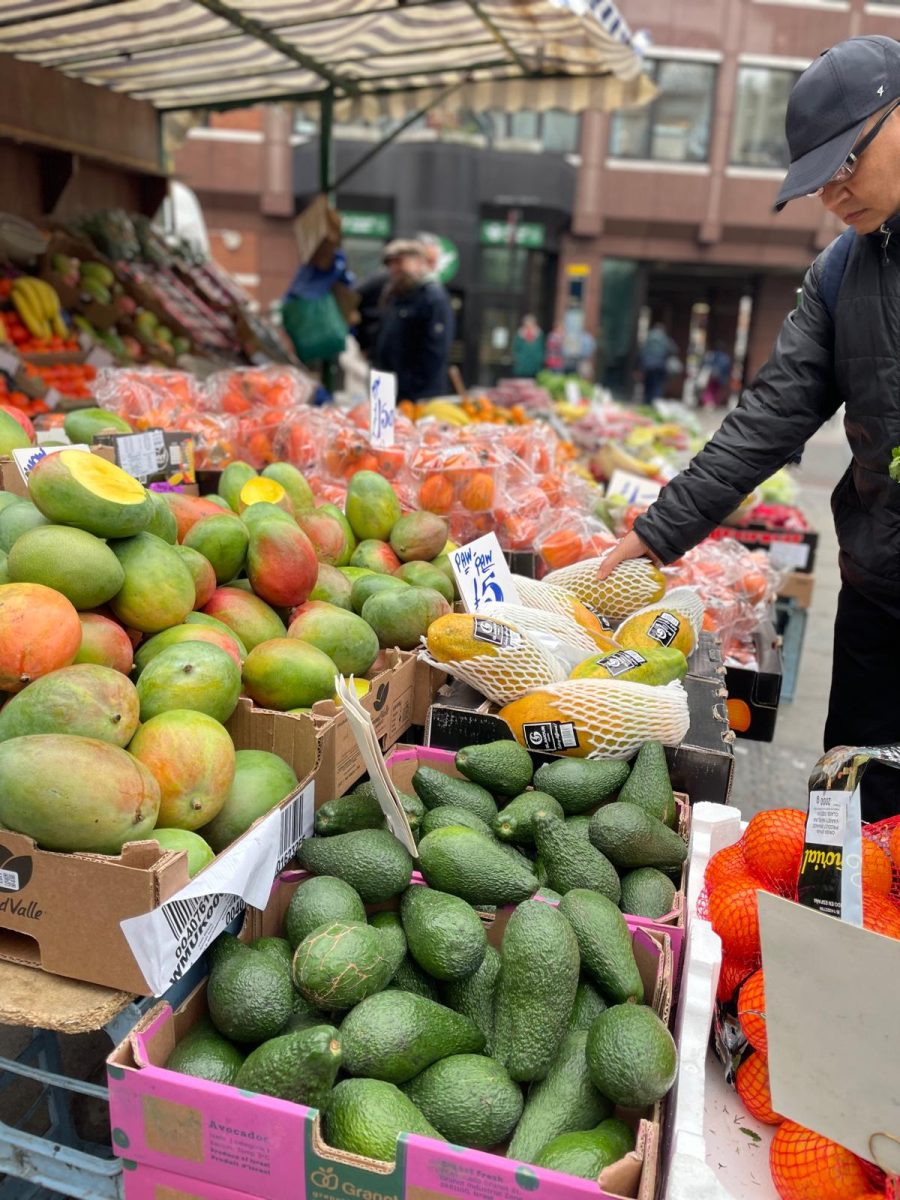Standing under the awning of his London fruit stall, Mick Szilágyi gestures with his cigarette at the surrounding buildings and says that none of them used to be here when he started his business.
Since 1977, Mick’s stand has been a neighborhood staple, every week Tuesday through Friday. He starts his day at 3 a.m. and some days he’s not finished until after 7 p.m. It’s the off-season for the stand at the moment but customers are always walking up to Mick’s stand, drawn in by the vibrant colors of his produce. Mick explains in his thick southeast London accent that “Summer time is the best time. We’ve got cherry season, nectarine, peach, avocados, and soft fruit season is the best.”
Mick’s stand sits across the road from Victoria Underground station and the Victoria Palace Theater; it’s a fresh site in an area otherwise dominated by glass-clad high rises, ever-present construction and the general musty stench of downtown London.
Observing the interview in progress, one of his workers chimes in and asks “Will he be in Hollywood this time next year? He’s been waiting for years!” These guys clearly feel right at home amongst the construction and hustle and bustle of this Westminster neighborhood.
Mick asks one of the guys if his fruit stand of 47 years has a name. “Knightriders of Summerland!” the worker jokes while bagging some oranges. Mick’s stall offers everything needed to build a full cornucopia – plump blueberries and raspberries, yellow-orange mangos and papayas and ruby red pomegranates.

It’s not just the quality of his goods that’s kept people coming back for four decades; Mick’s way of doing business harkens back to the days of mom and pop shops. “We’re very good with people. We’re very people oriented,” he says. “There aren’t too many stores that’ll say go on, come back and pay tomorrow. These days people say ‘oh well you don’t got no money, you don’t get any service.’”
Mick estimates that 85% of the customers do come back and pay. Most businesses wouldn’t mind nearly 50 years of success if all it cost was an orange or an apple here and there.
These days finding a fruit stand like Mick’s in central London is a challenge. “On Oxford Street, every corner used to have a fruit stall.” Mick said with a sigh.
He’s not a farmer, and it’s gotten tougher for him to get good produce at a fair price. For years he used a supplier in central London. “We don’t use them anymore because they prefer [to sell to] the catering companies.”
Mick now buys wholesale from a supplier near Heathrow Airport. Asked about the challenges to his business, specifically shoplifters, Mick describes what he called an epidemic. “I’ll be honest with you, this place now is full of zombies – lots of homeless people,” he says. “They’re all on drugs and shit like that.”
Mick gestures to one of his guys and says, “I couldn’t step in his shoes, you know; he looks after them all, always gives [the homeless people] a little something.”
Dean Dwire has worked for Mick for the past six years. “I love him. He’s like a brother to me,” he says. “He’s a top man, an absolute gentleman, rough on the outside but he’s good on the inside.”
Mick returns the compliment with a joke. “And he lies a lot!”
Mick adds, “I’ll tell you what — I imagine in California it’s 10 times worse out there,” he says of the homeless crisis. “One time a man overdosed in front of my stand and four ambulances showed up. They spent two to three hours out here and then the guy got up and walked away.”
Hands on his hips, Mick shakes his head. “London ain’t what it used to be,” he says. In regards to some crimes, Mick has a point; while knife crimes have held steady in the last few years, according to the National Health Service, cases of theft grew by 10,000 in London in 2023 and 2024.
Mick shares his thoughts about the recent farmers’ protest, in which farmers protested against proposed changes to the inheritance tax system for farmers. “We all hold our heads up for ’em. The government’s got it all wrong – we need Trump in here. That’s what we need.”
Mick is not alone in this sentiment. In the last quarter of this year, Britons’ support for Trump grew 7%. This is seemingly due to public perception of Trump being tough on crime, something which more than two-thirds of Britons favored when polled in 2022.
Mick feels slighted by the lack of support for businesses like his. “If they [the government] had their way, they’d just get rid of us [fruit stands] but if you go back in history, it’s part of London,” he says. “We’re a dying trade, you know, we’re a dying trade.”








